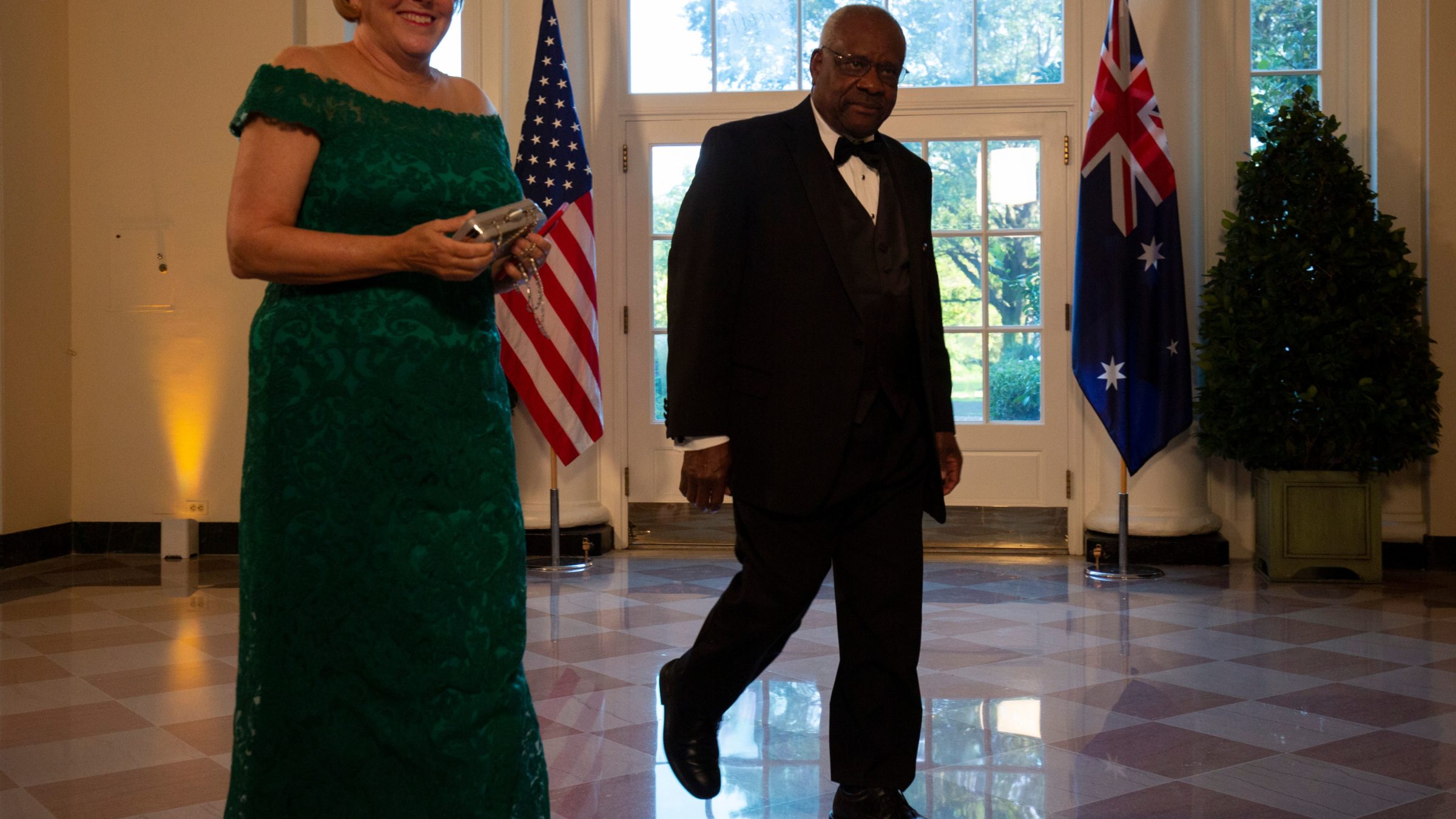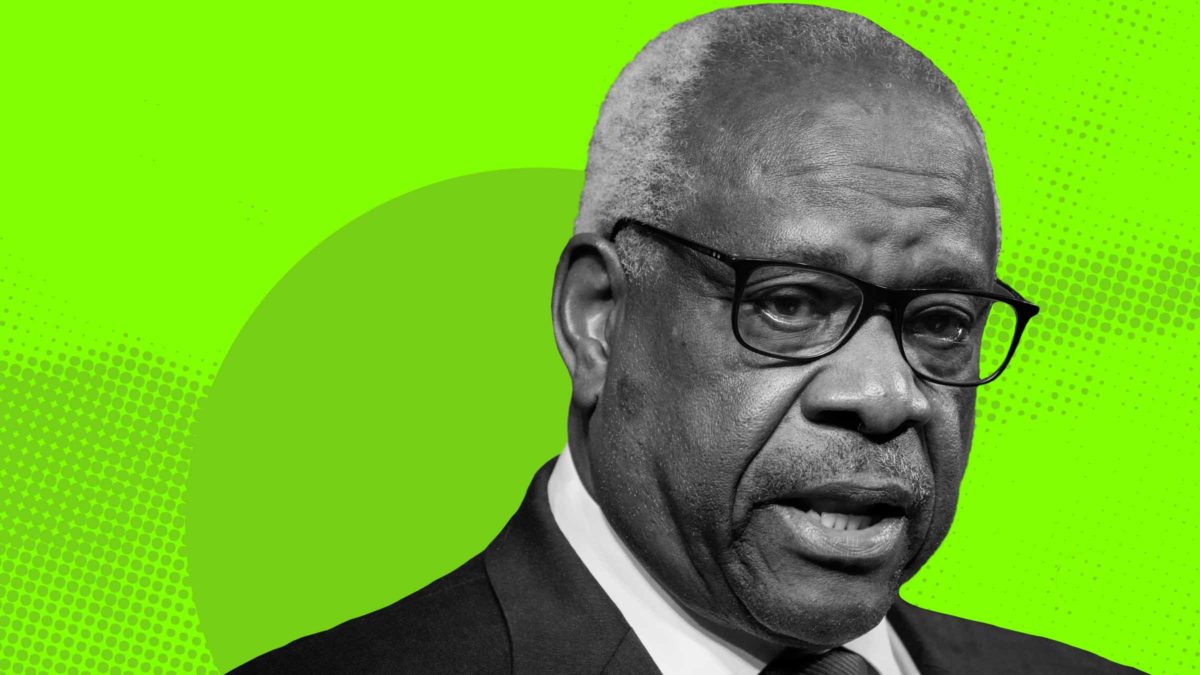Last week, Justice Clarence Thomas delivered a lecture about the most pressing credibility issues facing the Supreme Court. They are, in order, the growing support for adding justices to the Court, and the shadowy, nefarious world of “cancel culture attack.”
“You can cavalierly talk about packing or stacking the Court. You can cavalierly talk about doing this or doing that. At some point the institution is going to be compromised,” Thomas said, at an event hosted by the foundation of former Republican Senator Orrin Hatch in Salt Lake City. “By doing this, you continue to chip away at the respect of the institutions that the next generation is going to need if they’re going to have civil society.”
Astoundingly, Thomas’s purported concerns about a “compromised” Court made no mention of his wife Ginni’s numerous political activities on which The New York Times and The New Yorker reported earlier this year, many of which involve people and matters that regularly come before Thomas and the Court on which he sits. Together, the Thomases have done more to undermine the Court’s credibility than “cancel culture” or the notion of expanding the Court ever could.
Although Ginni has been a prominent fixture of headlines lately, her actions have raised eyebrows as far back as the early 2000s. As Peter Shamshiri noted in Balls & Strikes last week, Ginni was recruiting for positions in the George W. Bush administration while the Court was deciding Bush v. Gore, the case that more or less made Bush president. During the Trump administration, she was advocating for anti-trans policies as the Court considered a case in which it ultimately extended certain civil rights protections to trans people—an outcome from which Thomas dissented.
More recently, Ginni sparked controversy for her involvement with the Council for National Policy, a group that disseminated an ominously-titled “action steps” document in November 2020 instructing members to pressure Republican lawmakers to challenge the 2020 election results—and, if necessary, appoint alternate electors to cast votes for Trump. As the Times reported, the document framed the goals in existential terms: “Demand that they not abandon their Constitutional responsibilities during a time such as this.”
Ginni has also served in leadership of conservative groups that have appeared before the Court, none of which resulted in Thomas recusing himself. The New Yorker reported that Ginni’s consulting business had a lucrative contract with the Center for Security Policy, a group headed by Frank Gaffney, who wrote an amicus brief supporting President Donald Trump’s Muslim ban—a ban the Court ultimately upheld. On the website of Ginni’s firm, a client boasts that she has “access to any door in Washington.”

When you have for sure been cancelled (ALASTAIR PIKE/AFP via Getty Images)
The Thomas family’s ethically dubious dealings are not limited to Ginni. As a justice, Thomas has frequently participated in events that might reasonably call into question his impartiality. Twice, he has headlined events for the Eagle Forum, the anti-abortion group founded by Phyllis Schlafly; per the Times; in 2008, he spoke at events hosted by the Manhattan Institute and by billionaire Charles Koch. More recently, he opposed a proposed ethics rule that would have discouraged judges from membership in certain groups affiliated with a particular legal ideology. “I think they’re about to silence the Federalist Society,” he joked at an event hosted by, naturally, the Federalist Society. “So I guess I can’t come back.”
Emails that Ginni sent to members of Florida Governor Ron DeSantis’s administration raise even more questions. “My husband has been in contact with [DeSantis] too on various things of late,” she notes in the emails, which were obtained by The New Yorker. The emails do not define “various things” further, but given that DeSantis was embroiled in various federal court battles around the same time, news of clandestine discussions between a Republican politician and a Supreme Court justice are, at the very least, troubling.
During his remarks, Thomas also took some time to gripe about “cancel culture,” as is mandatory for every conservative personality over age 55. It is unclear where this fear comes from, exactly, given that both Ginni and Clarence Thomas have endured multiple scandals that entailed few, if any, meaningful repercussions for either of their careers. Like his colleague Justice Samuel Alito, Thomas usually cloaks his Fox-News-esque rhetoric in dry legalese, but in front of a friendly audience, it is indistinguishable from that of your average right-wing podcaster.
On Monday, Ginni Thomas gave a rare interview to the conservative Washington Free Beacon where she confirmed her attendance at the January 6 rally, but stated that she “played no role” in planning it. She also insisted that her and her husband’s careers remain separate. “Clarence doesn’t discuss his work with me, and I don’t involve him in my work,” she said.
Ginni’s claims here—that she supported people contesting the peaceful transition of power, but didn’t participate in the violent attempted coup that ensued—is not exactly exculpatory. More broadly, they certainly don’t resolve outstanding questions around the Thomases’ ethical misadventures. The Supreme Court depends for its legitimacy on the public’s trust. Clarence and Ginni’s recent protestations perhaps signal a concern that the more people learn about what the Thomases are up to these days, the more quickly that trust is eroding.

